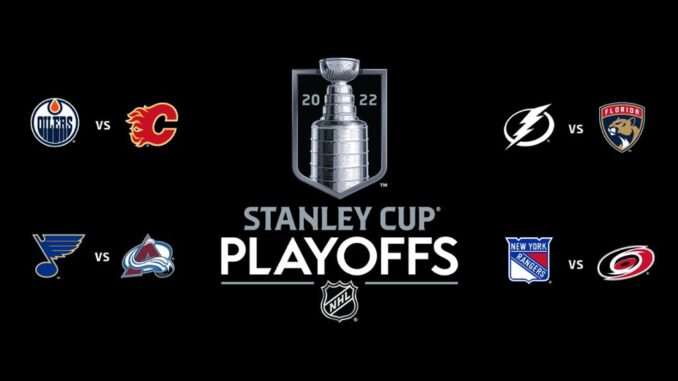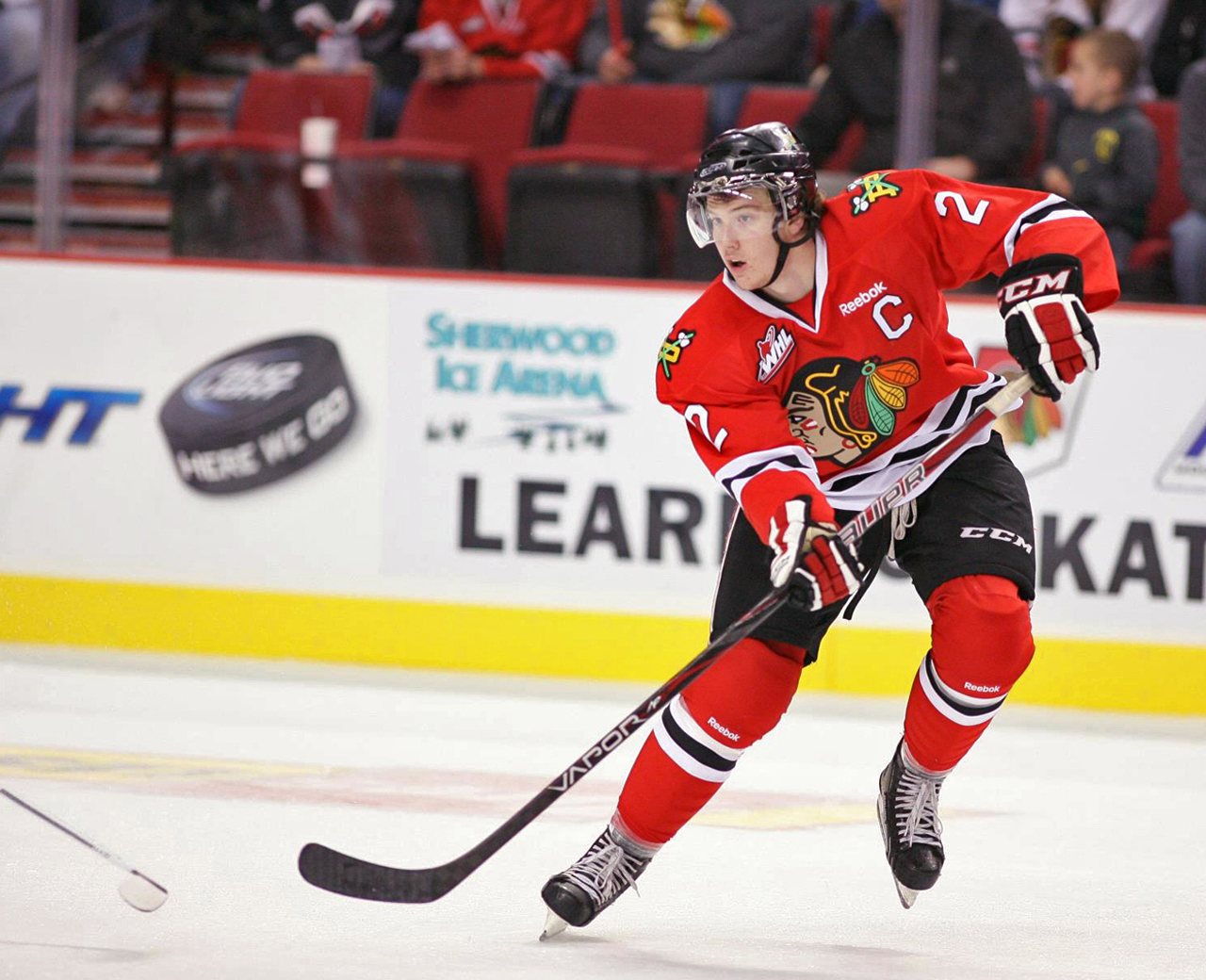
After the enthralling first round of the 2022 Stanley Cup Playoffs came to an end with Johnny Gaudreau and the Calgary Flames overcoming Jake Oettinger’s herculean effort in net, the second round is finally upon us. My prediction for the Stanley Cup winner remains in play, and I’ve yet to see anything that could dissuade me from my initial pick. Five first-round Game Sevens threatened to derail my entire bracket, but I emerged relatively unscathed, correctly predicting six out of eight series. Without further ado, let’s dig into my predictions for the second round of the 2022 NHL Playoffs, where I extend my streak of red-hot prognostication.
Eastern Conference Semifinals
Florida Panthers vs. Tampa Bay Lightning
After not meeting in the postseason over the first two decades since joining the NHL, the league’s two Florida-based franchises are re-upping for their second-consecutive playoff matchup.
Carter Verhaeghe dragged the Florida Panthers past the surprising Washington Capitals, leading the team in goals (six), assists (six), points (12), and expected goals (2.7). It’s a good thing, too, because star forward Jonathan Huberdeau (second in regular-season scoring) went ice-cold, only tallying three points in six games against the Capitals.
Relatedly, the Panthers’ vaunted power play failed to convert even once in the first round. For the fifth-best power play in the regular season (24.4%), that hit-rate is unacceptable. A positive regression is surely in the cards, but the Tampa Bay Lightning penalty kill (11th) won’t hand them any charity markers.
The Tampa Bay Lightning took the Toronto Maple Leafs’ best punch and triumphed in a thrilling Game Seven victory, with Nick Paul scoring both goals in a 2-1 win. Steven Stamkos (four points in seven games), Brayden Point (four in seven), and Anthony Cirelli (one goal) underwhelmed, and the Panthers won’t be as forgiving.
In a positive development from the Panthers’ point of view, perennial Vezina Trophy candidate Andrei Vasilevskiy looked mortal against the Maple Leafs. He posted a miserly .897 save percentage (SV%) and a +1.5 goals saved above expected (GSAx), which is solid but not a mark befitting of a superstar. Toronto is a potent offensive unit in its own right, but the Panthers (league-leading 4.11 goals per game) are an entirely different beast.
Sergei Bobrovsky did his job in the Florida net with a .906 SV% and a +3.6 GSAx, but like his fellow Russian, his performance doesn’t exactly scream prime Dominik Hasek. The health status of Brayden Point goes a long way in determining whether the Lightning can go head-to-head with the high-flying Panthers. If he sits or operates at less than full strength, Tampa Bay’s forward group quickly becomes less formidable.
Questions abound about the Lightning’s health and a neutered Florida power play should re-ignite: Panthers win series 4-3
Carolina Hurricanes vs. New York Rangers
Both the Carolina Hurricanes and New York Rangers had to navigate a Game Seven to get out of Round 1, defeating the Boston Bruins and Pittsburgh Penguins, respectively. Unfortunately for the Rangers, the Hurricanes pose a greater threat than the shorthanded Penguins.
At 5v5 play, the Hurricanes ranked second in their share of shot attempts (56.2% CF) and third in expected goals (55.7% xGF). Whether you value shot quantity or quality, Carolina takes care of both. Rather than employ any superstars, the Hurricanes score by committee. Sebastian Aho was the lone player to eclipse a point-per-game, but Andrei Svechnikov (30 goals) and Teuvo Teravainen (65 points) are skilled castmates. Jaccob Slavin spearheads an underrated blueline, with everything coalescing to cut New York’s season short.
In comparison, the Rangers were the worst 5v5 team to make the playoffs, only controlling 47.1% of xGF (23rd) and 47% of shot attempts (25th). They were able to overcome their even-strength shortcomings on the back of a superstar goalie (more on him later) and a potent power play (fourth at 25.2%).
Consequently, special teams could be the deciding factor in this series. The Hurricanes boast the best regular-season penalty kill (88%), and it will be tough to stymie the Rangers’ one-two punch of Artemi Panarin (sixth-most powerplay points) and Chris Kreider (first in powerplay goals). Toss in star center Mika Zibanejad (12th in powerplay goals) and a cast of up-and-coming young players like Kappo Kaako and Alexis Lafreniere, and the Rangers could have enough talent to persevere.
The X-factor in this series is goaltender Igor Shesterkin, the likely recipient of the 2021-22 Vezina Trophy as the NHL’s top netminder this season. While he led the league in GSAx and SV% behind a porous Rangers’ 5v5 defense, he stumbled in the first round with a .911 SV%. If he regains his Vezina form, New York stands a greater chance of overcoming the Hurricanes’ overwhelming swarm offense.
The Rangers slightly lucked out against a limping Penguins squad; Carolina is a much stronger – and healthier – foe: Hurricanes win series 4-1
Western Conference Semifinals
Colorado Avalanche vs. St. Louis Blues
In one of the most predictable outcomes of the first round, the Colorado Avalanche easily disposed of the Nashville Predators in a four-game sweep. Cale Makar tallied 10 points in Round 1, producing at the highest rate ever through four playoff games. Their power play converted on 43% of their opportunities, and Nathan MacKinnon’s regular-season cold streak is over, what with his five goals against the Predators.
Fortunately, the Avalanche narrowly avoided tragedy with Darcy Kuemper’s injury scare, and the netminder looks poised to continue playing at a Vezina Trophy level. He finished fifth in GSAx during the season and stopped over 92% of shots against. For a franchise that’s become used to crease-based playoff crises, this is about as secure as they’ve been in a long while.
As has become a common occurrence with the NHL’s current playoff format, the Avalanche are stuck playing arguably the Western Conference’s second-best team in Round 2 for the second year running. The St. Louis Blues lead the league with nine 20-goal scorers and boast a potent power play of their own, ranking fifth in the NHL. Young stars in Jordan Kyrou and Robert Thomas have taken huge leaps in their development, evolving into elite playmakers and puck transporters. In combination with steady veterans in Ryan O’Reilly and Vladimir Tarasenko, this is one of the deepest teams left in the postseason.
In the Blues’ net, Jordan Binnington appears to have regained his starting role and posted a .943 SV% in the team’s first-round conquest of the Minnesota Wild. If he’s back to being the Stanley Cup-winning goaltender rather than the middling one that’s occupied the net since then (45th in SV% since 2019-20 among goalies with ten games played), that’s a good omen for the Blues.
Both teams thrive on creating chances off of the rush, so whichever club is able to jam up their opponent’s gameplan first can gain the upper hand. The Blues have been hit by injuries on the blueline (Torey Krug missed the end of the first round), forcing players higher in the lineup. If they have one weakness, it’s that the defense group pales in comparison to the Avalanche core that is led by Makar, and supplemented by Devon Toews, Samuel Girard, and Bowen Byram.
The Blues are one of the few teams equipped to go toe-to-toe with the Avalanche, but Colorado’s star power should prevail: Avalanche win series 4-2
Calgary Flames vs. Edmonton Oilers
After Gaudreau finally solved the impenetrable Oettinger in overtime, the Flames and Edmonton Oilers were penciled in for the first postseason Battle of Alberta since 1991. The two franchises haven’t been this good at the same time in a while, so it’ll be a truly special occasion.
Priority number one for the Flames is to slow down Connor McDavid, currently clicking at two points per game through the first round of the playoffs. He’s going to get his, so perhaps their energy should be better spent elsewhere. Regardless, coach Darryl Sutter should deploy his shutdown line of Andrew Mangiapane-Mikael Backlund-Blake Coleman to neutralize McDavid and Leon Draisaitl while letting his offensive stars in Gaudreau, Elias Lindholm, and Matthew Tkachuk (all 40-goal scorers) run free. The trio combined for only six goals in seven first-round games so more will be needed to surpass the Oilers.
In an interesting turn of events, 40-year-old Mike Smith has turned back the clock, posting the highest GSAx total of the first round. He’s at the tail end of a respectable career, so the motivation to perform might be keeping an otherwise flaky netminder afloat. Which Smith shows up against the Oilers?
Although they ran into the American reincarnation of Hasek in Oettinger, the Flames prevailed over the Stars because of the sturdiness of Jacob Markstrom. After an impeccable regular season that garnered him a Vezina Trophy nod, the Swedish goaltender saved 4.8 GSAx (third) and submitted a sparkling .943 SV%, both postseason marks somehow lagging behind the Oilers’ Smith.
As always seems to be the case with the Oilers, the outcome of this series hinges on whether Edmonton’s depth behind their two superstars can produce. Evander Kane (seven goals in Round 1) is proving to be the perfect running mate, while Zach Hyman and Ryan Nugent-Hopkins (two goals each) have been decent but not otherworldly.
The Oilers have the superstars, but the Flames have the team: Flames win series 4-2
2022 Conn Smythe Trophy Watch
- Connor McDavid, Edmonton Oilers (7GP; 4G 10A 14PTS)
- Cale Makar, Colorado Avalanche (4GP; 3G 7A 10PTS)
- Carter Verhaeghe, Florida Panthers (6GP; 6G 6A 12PTS)
- Mike Smith, Edmonton Oilers (7GP; .938 SV%; 10.4 GSAx)
- Mika Zibanejad, New York Rangers (7GP; 3G 8A 11PTS)
Honorable Mention: Jake Oettinger, Dallas Stars (7 GP; .954 SV%; 10.1 GSAx)




